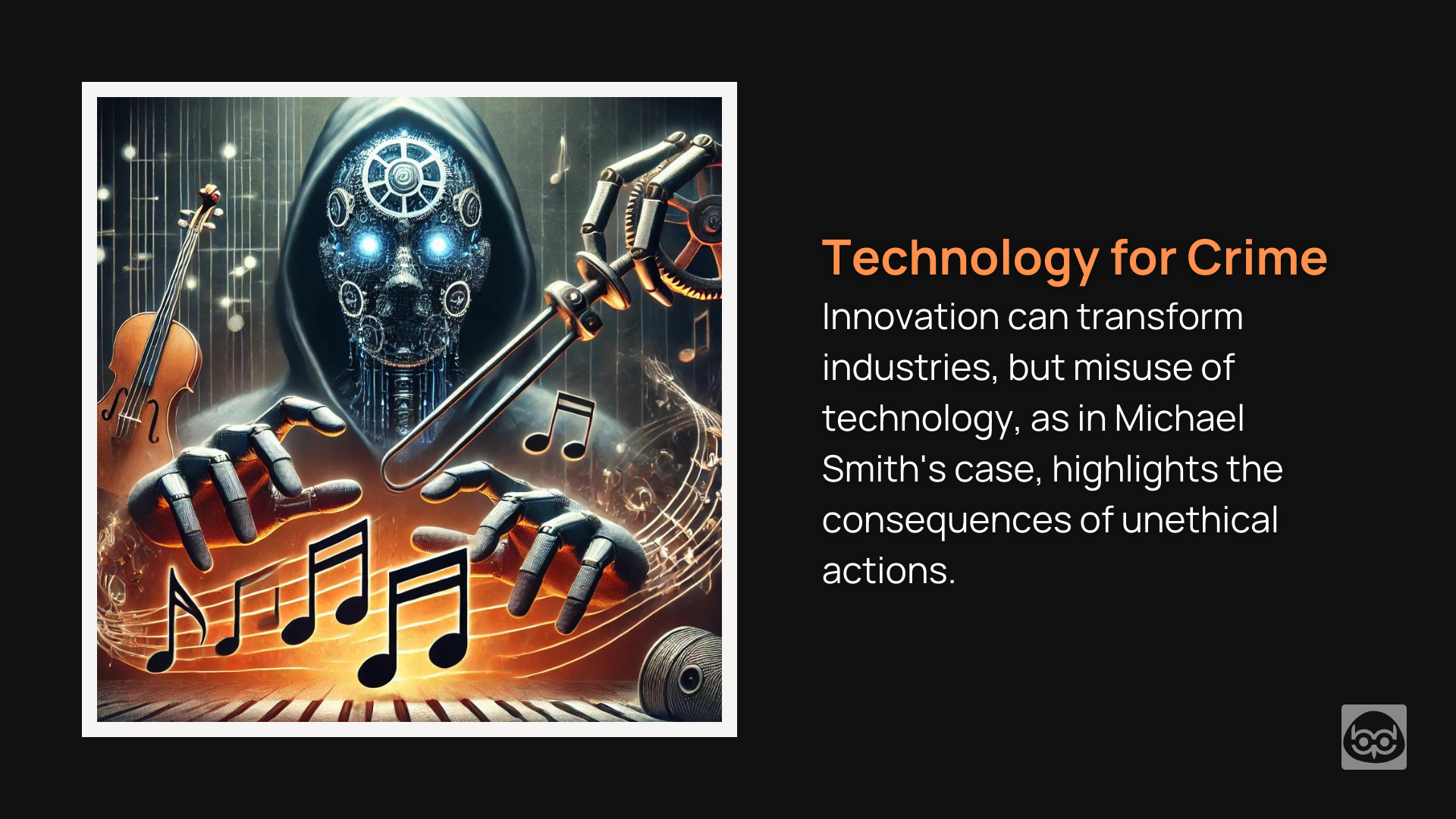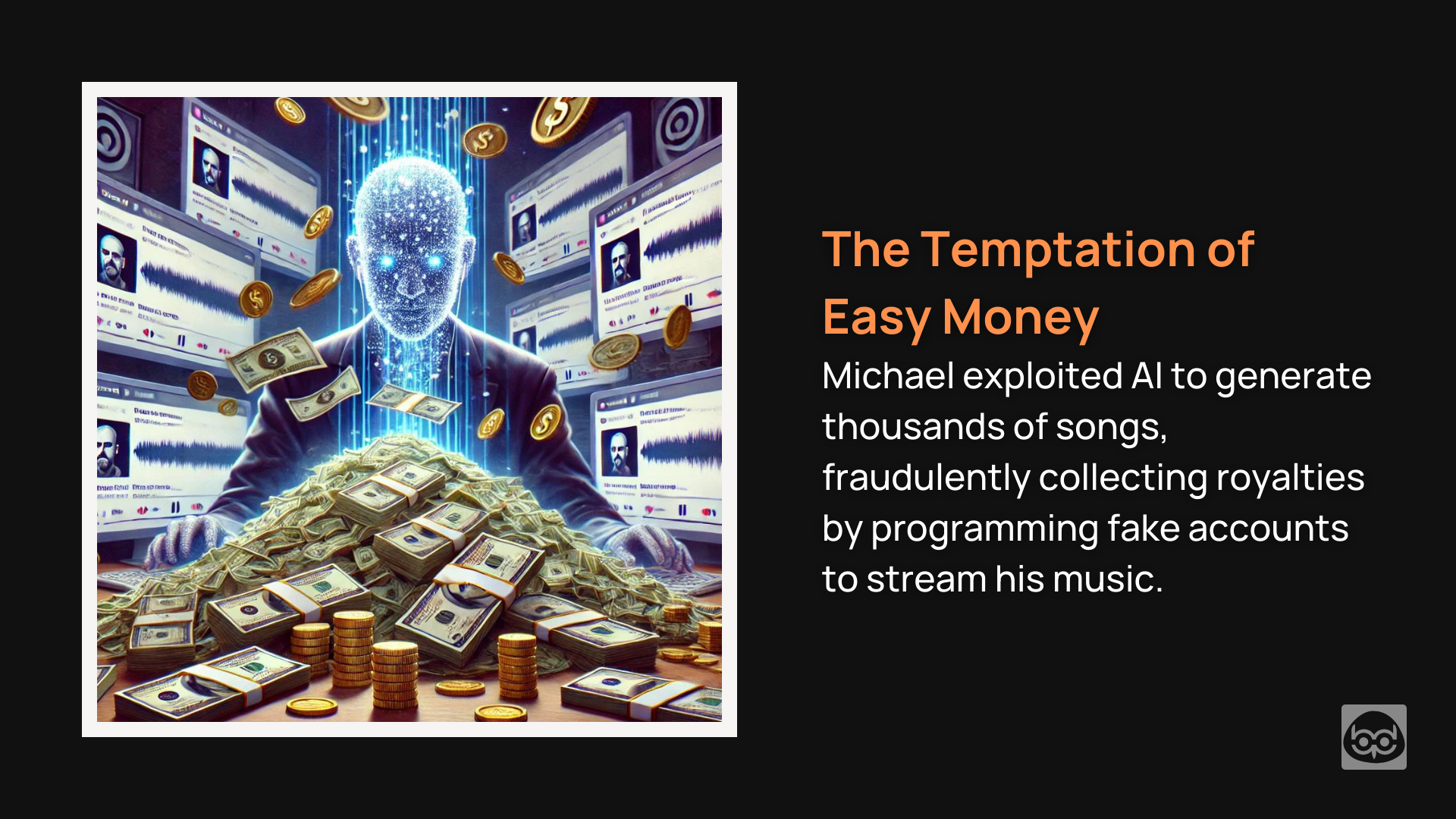Reinventing Royalties: When AI Innovation Composes a Path to Prison
At Disrupting the Norm, we celebrate innovators and their groundbreaking ideas that challenge the status quo and change the world for the better. Innovation has the power to uplift, inspire, and transform industries. However, we must also recognize that, at times, disruption can bring unintended consequences. Today's story illustrates how innovation, when misused, can become a tool for wrongdoing.
We are not here to celebrate Michael Smith. Instead, we highlight how AI was used to fuel crime, exposing the darker side of innovation when it falls into the wrong hands. Through his story, we hope to emphasize the importance of ethics in innovation and the consequences of getting lost from the right path.
The Dream of Making Music
Michael Smith, a musician from North Carolina, had always dreamed of making it big in the music industry. His passion for creating melodies was undeniable, but his small catalog of original songs struggled to find its place in the crowded world of digital streaming. The competition was fierce, and the royalties from his music were minimal, hardly enough to make a living.
But then, something changed. In 2017, Michael discovered the world of artificial intelligence (AI). It was like magic. AI could create music, effortlessly producing new songs with just a click. This new technology offered him a path to success that he had never imagined.
The Temptation of Easy Money
As Michael started experimenting with AI-generated music, an idea began to form in his mind. What if he could use this technology to create thousands of songs, upload them to streaming platforms, and watch the royalties pour in? It seemed like an easy way to turn his fortunes around.
And so, the plan was set in motion. Michael created thousands of fake accounts on streaming platforms, programmed them to play his AI-generated songs on a loop, and started collecting payments. It worked as planned. By 2019, he was making over $100,000 a month from about 661,000 transmissions per day, but his success wasn't built on real talent or genuine fans. It was built on deception.
The Cost of Deception
Michael's scheme brought in millions of dollars, but it came at a high cost. Other musicians, songwriters, and creators, people who had spent years honing their craft, lost out on the royalties they rightfully deserved. The fraud went unnoticed for a while, but eventually, the music industry began to investigate.
In 2024, the truth came to light. Michael Smith was arrested and faced serious federal charges of fraud and conspiracy. The fraud involved working with an executive of an AI company and a music promoter, who were not named in the indictment. His journey from a struggling musician to a millionaire had ended in disaster. He now faces up to 60 years in prison, and the music industry is left to repair the damage caused by his actions.
The Resilience of the Music Industry
The music industry has shown remarkable strength in facing challenges, including those posed by Michael Smith’s actions. Despite this setback, artists around the world continue to create and share their passion. This incident has driven the industry to focus even more on the responsible use of technology, such as AI, while emphasizing fairness and genuine talent.
It's important to recognize that having great talent does not always guarantee success. However, the music world is diligently working to support authentic artists by developing better ways to protect music and promote true creativity. This effort provides hope for a future where innovation and creativity work together to enhance the music industry for everyone.
A Cautionary Tale for Ethical Innovation
Michael Smith's story shows the problems that can arise when technology is misused. He exploited artificial intelligence to create fake music, deceiving the system for personal gain. This not only earned him millions but also harmed other musicians and the industry. His actions led to his arrest and potential imprisonment, disrupting fairness in the music world.
This tale teaches us that meaningful innovation goes beyond just creating something new; it’s about using ideas to improve our world. As we advance, we must handle new technologies with wisdom, ethics, and care. True progress happens when innovation is guided by strong values, ensuring that everyone benefits, not just a few. Technological advancement without ethics does not create permanent advancement, instead, it creates short-live progress and chaos. For instance, nuclear weapons brought scientific progress but also immense devastation and global instability, while the rise of social media, despite connecting people, has fueled misinformation and social division when left unchecked. A shared ethical framework for innovation and technological advancements is a priority.
Detailed Information About This Case
For more details, check out the press release from the US Department of Justice (USDOJ) about the case: https://www.justice.gov/usao-sdny/pr/north-carolina-musician-charged-music-streaming-fraud-aided-artificial-intelligence
Prefer Watching to Reading?
Check out our vlog: See how AI transformed a musician's dream into a $10 million fraud scheme.







